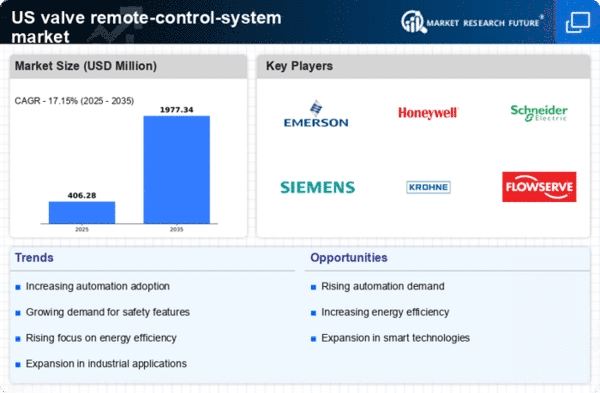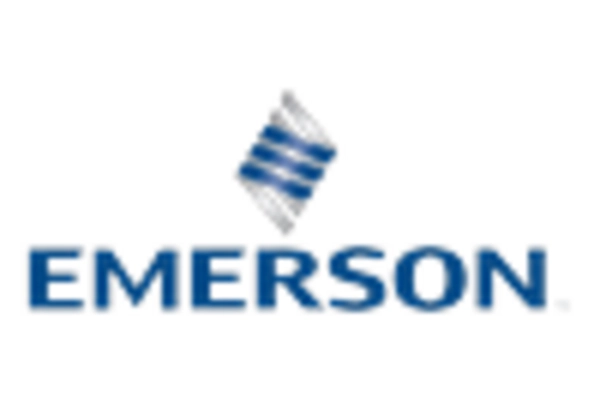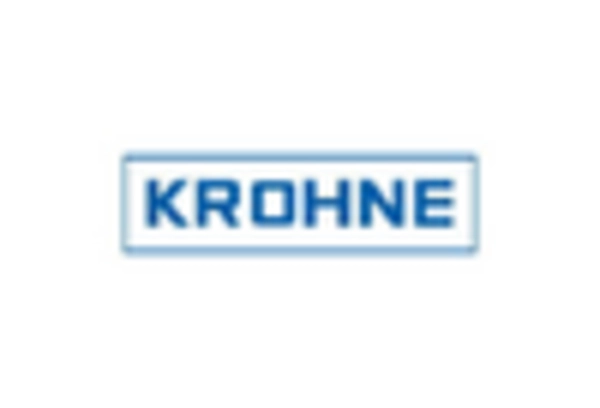Growth in Infrastructure Development
the market is poised for growth due to the ongoing expansion of infrastructure projects across the United States. As urbanization accelerates, there is a heightened demand for efficient water management systems, energy production, and transportation networks. These infrastructure developments necessitate the integration of advanced valve control systems to ensure optimal performance and reliability. The U.S. government has allocated substantial funding for infrastructure improvements, which is likely to create opportunities for the valve remote-control-system market. With an estimated investment of over $1 trillion in infrastructure over the next decade, the market is expected to benefit significantly from this trend, as industries seek to modernize their systems.
Rising Demand for Efficient Operations
The valve remote-control-system market experiences a notable surge in demand driven by the need for enhanced operational efficiency across various sectors. Industries such as oil and gas, water treatment, and power generation are increasingly adopting these systems to streamline processes and reduce operational costs. The integration of remote control capabilities allows for real-time monitoring and management, which can lead to a reduction in downtime and maintenance costs. According to recent estimates, the market is projected to grow at a CAGR of approximately 6.5% over the next five years, reflecting the industry's shift towards automation and efficiency. This trend indicates a robust future for the valve remote-control-system market as companies seek to optimize their operations and improve productivity.
Regulatory Compliance and Safety Standards
The valve remote-control-system market is significantly influenced by stringent regulatory compliance and safety standards imposed by governmental bodies. Industries are compelled to adhere to these regulations to ensure safe operations, particularly in hazardous environments such as chemical processing and oil extraction. The implementation of remote control systems not only aids in meeting these compliance requirements but also enhances safety by minimizing human intervention in dangerous situations. As regulations evolve, companies are likely to invest in advanced valve control technologies to maintain compliance, thereby driving growth in the valve remote-control-system market. The financial implications of non-compliance can be severe, further motivating industries to adopt these systems.
Technological Advancements in Control Systems
Technological advancements play a pivotal role in shaping the valve remote-control-system market. Innovations such as IoT integration, AI-driven analytics, and enhanced communication protocols are transforming how industries manage their valve operations. These advancements enable predictive maintenance, which can significantly reduce operational disruptions and costs. The market is witnessing a shift towards more sophisticated control systems that offer improved reliability and functionality. As industries increasingly recognize the benefits of these technologies, investment in valve remote-control systems is expected to rise. This trend suggests a promising outlook for the market, with potential growth rates reaching 7% annually as companies seek to leverage technology for operational excellence.
Increased Focus on Environmental Sustainability
The valve remote-control-system market is increasingly influenced by the growing emphasis on environmental sustainability. Industries are under pressure to reduce their carbon footprint and enhance energy efficiency, prompting the adoption of technologies that support these goals. Remote control systems facilitate better resource management and minimize waste, aligning with sustainability initiatives. As companies strive to meet environmental regulations and consumer expectations, the demand for valve remote-control systems is likely to rise. This trend indicates a shift towards greener technologies, with the market projected to expand as industries prioritize sustainable practices in their operations.

















